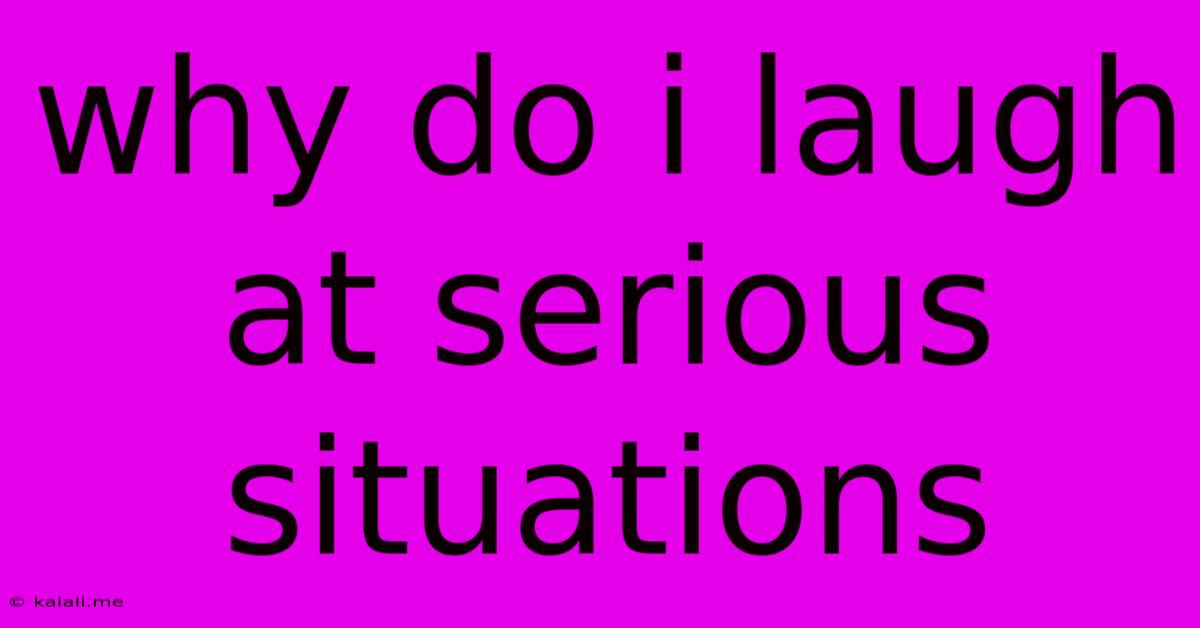Why Do I Laugh At Serious Situations
Kalali
May 21, 2025 · 3 min read

Table of Contents
Why Do I Laugh at Serious Situations? Understanding Inappropriate Laughter
Laughing at inappropriate times, like during serious situations, can be confusing and even upsetting. It's a common experience, but understanding why it happens can help you manage it. This article explores the various reasons behind this seemingly contradictory behavior, from neurological hiccups to deep-seated coping mechanisms. We'll unpack the science behind inappropriate laughter and offer strategies for navigating these moments.
Inappropriate laughter, also sometimes referred to as nervous laughter or incongruous laughter, isn't necessarily a sign of a serious psychological issue. However, understanding its root causes can lead to greater self-awareness and potentially improve emotional regulation.
Neurological Explanations: The Brain's Unexpected Response
Sometimes, inappropriate laughter is simply a neurological glitch. Our brains are complex organs, and sometimes their processing can be…off. Think of it like a computer error: the system is trying to process information, but the output is unexpected. In these cases, laughter might be a misfiring of the brain's reward system or a stress response that manifests in an unusual way. Stress, anxiety, and even pain can trigger this unexpected response. The brain might be overwhelmed and choosing laughter as a less emotionally taxing response than, say, crying or screaming.
Psychological Factors: Coping Mechanisms and Defense Mechanisms
Often, inappropriate laughter serves as a coping mechanism. When faced with a serious or uncomfortable situation, laughter can be a way to:
- Manage anxiety: Laughter can act as a distraction, diverting attention from the stressful situation. It's a way to create a momentary escape from difficult emotions.
- Deflect uncomfortable feelings: Laughter can be a defense mechanism, used to avoid dealing with difficult emotions like sadness, fear, or anger. This is often subconscious.
- Reduce tension: In high-stress environments, laughter can provide a brief release of tension, even if it seems inappropriate in context. This is especially true in situations where expressing other emotions might be socially unacceptable or even dangerous.
- Maintain a sense of control: In situations where we feel powerless, laughter can ironically create a sense of control, albeit a fragile one. It allows us to reclaim some agency in a situation we might otherwise find overwhelming.
Social Context: The Influence of Environment and Expectation
The social setting greatly influences our reaction. We might laugh in serious situations to:
- Fit in: In some social circles, laughter is used as a way to bond or maintain a sense of normalcy. Even in the face of adversity, shared laughter can create a sense of unity.
- Ease tension: Laughter can be used to diffuse a tense situation, helping to de-escalate conflict or awkwardness. This is particularly relevant in situations involving authority figures or potential conflict.
- Avoid confrontation: Laughter can be a subtle way to avoid directly addressing a difficult topic or disagreeing with someone. It's a way to deflect without being overtly confrontational.
When to Seek Professional Help
While inappropriate laughter is often harmless and simply a quirky response to stress, it can also be a symptom of underlying mental health conditions. If your inappropriate laughter is:
- Frequent and disruptive to your daily life: If it's impacting your relationships or ability to function, it warrants attention.
- Accompanied by other symptoms: If you experience other symptoms like anxiety, depression, or panic attacks, seeking professional help is crucial.
- Causing you distress: If you are concerned about your laughter and it's causing you emotional distress, seeking help is essential.
If you're concerned about your laughter, talking to a therapist or counselor can provide valuable insight and support. They can help you identify the underlying causes and develop strategies for managing your responses to challenging situations.
In conclusion, understanding why you laugh at serious situations involves examining a complex interplay of neurological, psychological, and social factors. While sometimes simply a quirk of the brain, it's important to pay attention to the frequency and context of your laughter and to seek professional help when necessary. Self-awareness and understanding are the first steps towards managing this common, yet sometimes puzzling, phenomenon.
Latest Posts
Latest Posts
-
Do You Need Masters Before Phd
May 21, 2025
-
How To Stop Paint From Flaking
May 21, 2025
-
Is A Middle Name A Forename
May 21, 2025
-
Thank You For Your To This Matter
May 21, 2025
-
One Tick On Whatsapp But Not Blocked
May 21, 2025
Related Post
Thank you for visiting our website which covers about Why Do I Laugh At Serious Situations . We hope the information provided has been useful to you. Feel free to contact us if you have any questions or need further assistance. See you next time and don't miss to bookmark.